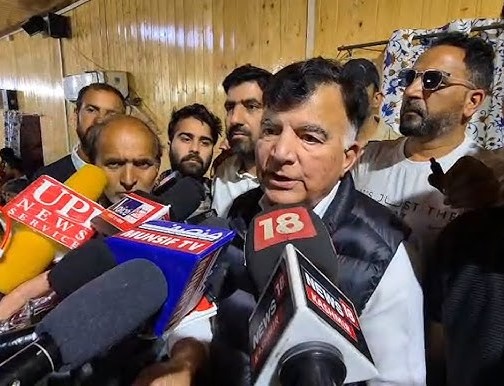A Call for Accountability in J&K Governance
By: Javid Amin | Srinagar | 16 July 2025
Mehboob Beg’s Challenge to Omar Abdullah Sparks Debate on UT Limitations
As political heat intensifies in Jammu & Kashmir, senior National Conference leader Mehboob Beg has delivered a rare internal rebuke to his party’s leadership, challenging Chief Minister Omar Abdullah to either present a tangible list of accomplishments or admit the constraints imposed by the Union Territory model.
Background: Omar’s Return Amid Constitutional Constraints
When Omar Abdullah returned to power in October 2024, it marked a significant political turnaround. But the comeback came with a caveat: J&K is now a Union Territory, not a full-fledged state.
This means:
-
The elected government lacks control over policing, law & order, and key administrative portfolios.
-
The Lt Governor, appointed by the Centre, continues to hold overarching powers, especially in security, appointments, and legislative assent.
From Mandate to Muzzles: The Governance Dilemma
Despite the massive electoral mandate and symbolic return of democratic institutions, the Abdullah-led coalition has struggled to translate promises into policy outcomes.
Government’s Initiatives So Far:
-
Mission Yuva: Launched to generate 4.5 lakh jobs and 1.5 lakh startups.
-
Free bus travel for women to boost mobility and safety.
-
Marriage assistance scheme and scholarships for economically weaker sections.
-
Academic calendar reforms to synchronize with national education timelines.
-
Resolutions for restoration of statehood and Article 370 protections.
However, many of these initiatives are either policy proposals or limited to symbolic gestures—stymied by administrative bottlenecks and the veto power of the Lt Governor’s office.
The Criticism: “We Can’t Live in Ambiguity Forever”
Mehboob Beg’s remarks are being viewed as both a political warning and a public reality check. In a recent public meeting, he stated:
“If we can’t deliver, we must say so. If we have succeeded, we must show how. We can’t keep blaming Delhi while pretending we’re fully in charge here.”
His criticism resonates with growing sections of civil society and youth, who question:
-
Why political prisoners remain detained even after elections.
-
Why jobs and recruitment drives have stalled.
-
Why there is no timeline or roadmap for statehood restoration.
PDP & Other Allies Join the Chorus
The Peoples Democratic Party (PDP) has been more direct in its critique. Waheed ur Rehman Parra, a prominent PDP voice, recently said:
“This government has made U-turns on political prisoners, on Article 370, on special status, and even on employment guarantees. The people deserve clarity, not theatre.”
Even within opposition circles, questions of legitimacy vs. effectiveness are intensifying.
Why Mehboob Beg’s Intervention Matters
Beg’s criticism isn’t just political—it’s symbolic:
-
He is a veteran political moderate, rarely confrontational.
-
His words reflect deep frustration within the National Conference cadre, who feel caught between aspirations and administrative paralysis.
His statement also pressures Omar Abdullah to clarify his strategy:
-
Is the administration pushing back hard enough against the Lt Governor’s interference?
-
Is the state prepared to go beyond resolutions into civil or legal resistance?
-
Or is the NC content managing “a glorified municipality” under a UT banner?
The Balancing Act: Governance vs. Autonomy
Omar Abdullah now faces a defining moment:
-
If he accepts the limitations imposed by the UT model, he risks undermining the people’s mandate and his party’s historic stance on autonomy.
-
If he resists too aggressively, he risks inviting another constitutional standoff with the Centre—which could affect funding, security cooperation, and bureaucratic cohesion.
He must walk the tightrope:
-
Govern effectively within limits,
-
Push persistently for restoration of full statehood,
-
And communicate clearly with the public on what is and isn’t possible.
The Bigger Picture: A Test of Post-370 Governance
Beg’s remarks open up a larger philosophical question:
Can democracy thrive in a Union Territory with limited autonomy and no local control over policing or appointments?
Or more bluntly:
What’s the point of elections if power remains centralized in New Delhi?
In the post-Article 370 era, this debate is no longer theoretical. It’s playing out in real time—and Mehboob Beg has just lit a spark within the ruling party itself.




